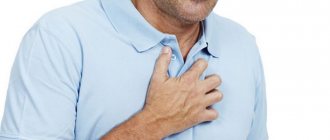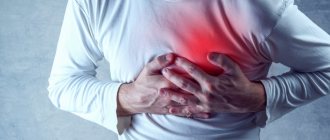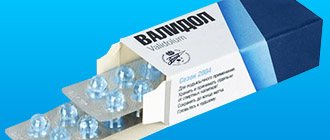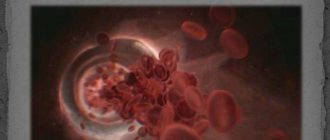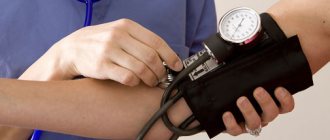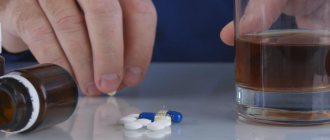Home>Articles> How dangerous is it to take Corvalol and Valocordin with alcohol?
quick menu (hide)
- Compatibility of Valocordin and alcohol
- In what cases can you combine drugs with alcohol?
- What can you buy at the pharmacy for a hangover?
- Traditional medicine for hangovers
Preparations containing phenobarbital are incompatible with alcohol. This rule applies to Corvalol, Valocordin, Valoserdin. You can drink such heart remedies some time before drinking alcohol, or after drinking libations, having agreed upon this possibility with your doctor.
Compatibility of Validol and alcohol
? Validol is prescribed for neuroses, diseases of the cardiovascular system, sleep disorders, and stress. They drink it to get rid of anxiety, fears and worries.
Often the purpose of drinking alcohol is to rest, relax, and not think about problems.
The active substance in the medicine is levomenthol solution in menthyl isovalerate. It dilates blood vessels and gives a calming effect.
Ethanol, entering the blood, increases the lumen of blood vessels and reduces the resistance of the vascular walls. Like the main substance, it has a vasodilating effect.
A one-time dose will increase the risk of side effects of the drug, minimize the therapeutic effect and worsen the patient's health.
It is forbidden to drink the drug with ethanol together. It is dangerous to mix medicine with alcohol if the patient has heart disease.
conclusions
So, alcohol and Validol have the opposite effect, so when they are combined, the body experiences additional stress on most systems. When taking pills in the midst of a feast, myocardial vessels may dilate, which will provoke acute cardialgia. Many experts do not recommend combining the drug with alcohol, since the consequences can be unpredictable.
Practice shows that in some patients, when combining these substances, the body became so relaxed that they lost the ability to control bowel movements and urination. No one wants to find themselves in such a situation, so it is better not to take risks and refuse such a combination.
You can take Validol only after alcohol has been removed from the body, and alcohol is allowed only 3-4 hours after taking the medicine.
Any, even the most “harmless” medicine requires a careful and responsible attitude, so before taking it, you must definitely talk to a specialist or at least read the attached instructions. Even herbal preparations may be incompatible with alcohol, so be smart.
Brief characteristics of the drug
“Validol” (Levomenthol) is a sedative in the form of tablets or liquid. Belongs to the group of reflex-vasodilators. The tablet is placed under the tongue, where it quickly dissolves and begins to act within 5 minutes.
The solution is available in ampoules of 5 milliliters. To take it, you need to drop 4-6 drops onto a piece of sugar and place it under your tongue until dissolved.
A drug:
- Reduces pain.
- Improves peripheral blood circulation.
- Relieves nervous tension and relieves spasm of heart vessels.
Indications:
- Pain in the left half of the chest, not associated with damage to the arteries of the heart;
- Disorder of the nervous system without anatomical changes in tissue;
- Attacks of angina, tachycardia
- Rapid heartbeat, irregular heart rhythm;
- State of hysteria;
- Neuroendocrine regulation disorders;
- Toxicosis in pregnant women;
- Hangover syndrome (as an aid).
Contraindications:
- Age under 14 years.
- Chronic alcoholism.
- Intolerance to the components of the drug.
- Low blood pressure in chronic form.
- Diabetes mellitus of the first, second type.
- Acute myocardial infarction.
Side effects:
- Nausea, vomiting, poisoning in case of overdose;
- Tearfulness, increased saliva production;
- A sharp decrease in blood pressure;
- Dizziness, headache;
- A sharp drop in vascular tone;
- Fainting, slow reactions.
Side effects after administration are rare.
Use of the drug for alcoholism
Alcoholism is a contraindication to taking the drug. The combination of substances disrupts the functioning of all organs.
There is a dilatation of the blood vessels of the heart with the development of pain.
The body of chronically addicted people is so exhausted that mixing will lead to unexpected consequences:
- Involuntary urination and defecation.
- Complete loss of control and conscious state.
- Severe poisoning.
The drug is metabolized in the liver and excreted by the kidneys in the form of glucuronides. If the exocrine gland is sick and the medicine is mixed with ethyl alcohol, the condition of the liver can worsen to a sharply critical level.
When treating people with alcohol addiction, you need to consult a doctor. He will tell you how long you need to abstain from alcohol before starting treatment, and after how long you can take the drug.
Using the drug for a hangover
It is taken during the post-intoxication period after drinking alcoholic beverages. But hangover medicine doesn't help much.
Action for hangover syndrome:
- Removes unpleasant odors from the mouth;
- Relieves mild headaches;
- Removes attacks of nausea;
- Reduces heart pain;
- Reduces Hell.
It may have unpredictable effects when used during a hangover. Alcohol breakdown products still circulate in the blood, which have a bad effect on internal organs.
Taking the drug can provoke an exacerbation of nervous and cardiovascular diseases.
Consequences of drinking alcohol
The most harmless thing that can happen when mixed with an alcoholic drink is the neutralization of the medicinal effect.
But probably:
- The occurrence of side effects of the drug.
- Severe poisoning of the body, intoxication.
- Dysfunction of internal organs.
The sedative effect of the drug in combination with ethanol will lead to very slow reactions, confusion and fainting. Blood pressure may drop to critical levels.
Symptoms of poisoning appear as:
- Severe vomiting;
- Dizziness;
- Excessive salivation and tearing;
- Swelling, skin rashes;
- Depression of the central nervous system.
Drinking alcohol together with the drug when contraindicated leads to aggravation of existing diseases, kidney and liver failure, and sometimes death.
Is it possible to drink Validol after alcohol?
ALCOHOL AND FAMILY
ALCOHOL AND CAR
ALCOHOL AND THE BODY
ALCOHOL AND MEDICINES
Is it possible to drink Validol after alcohol?
Validol, a well-known sedative, especially effective for emotional breakdowns or heart pain, has become a real “pocket” medicine for many of our citizens. They carry it with them so that, if necessary, they can immediately take a life-saving pill. But many people don’t even think about whether this remedy can be used often, or whether it is allowed to be mixed with other medications.
And some of the especially frivolous citizens, without hesitating for a minute, take Validol against the background of alcohol intoxication. Let's find out whether Validol and alcohol are compatible and how such a combination will affect your well-being. Moreover, taking into account the opinion of doctors who are categorically against this tandem.
A little about the drug
Validol belongs to the group of vasodilators and sedatives. This medication is available in three forms:
- Drip.
- Encapsulated.
- Tableted.
Most often, Validol tablets are used, which are placed under the tongue and dissolve. The active components of the drug irritate the nerve endings located on the mucous membrane. Which ultimately leads to a reflex expansion of the coronary and vascular channels. This stabilizes the patient’s condition.
Validol helps relieve pain syndromes in the heart area, significantly improving peripheral blood supply. The effect of the drug is felt within 3-4 minutes after administration.
Specifics of impact
This medicine has a powerful sedative effect. Thanks to this, the medicine has a wide range of applications. It is successfully used to relieve many pathological conditions associated with heart ailments or nervous tension. Validol, according to its instructions, is used in the following cases:
- neuroses;
- increased hysteria;
- cardiac problems;
- migraines (especially associated with long-term use of nitrates);
- with increased sensitivity of the vestibular apparatus (motion sickness when traveling).
The main components of the product are menthol and isovaleric acid. Many modern experts believe that this medicine, known to us since the times of the Soviet Union, is an ordinary placebo. Of course, such a drug cannot prevent the development of heart attack/stroke. But it is quite possible to relieve palpitations and calm a person with the power of this medicine.
Strong and Validol
As for the situation of combining alcohol and this medication, it is quite common. The point is ethanol’s ability to have a dilating effect on vascular tissue. The intoxicated person feels pleasant euphoria and relaxation, because the blood vessels in the brain areas dilate. True, this reaction does not last long; it is replaced by the opposite - narrowing of the vascular areas and their subsequent spasm, which provokes tachycardia.
Of course, a person accustomed to Validol immediately takes it in the hope of stabilizing the condition, not paying attention to the recent intake of intoxicating drugs. And without even wondering whether it is possible to drink Validol after alcohol. Experimenting with this is strictly prohibited.
The use of Validol against the background of alcohol intoxication is unacceptable. This tandem leads to a sharp deterioration in well-being and has an extremely detrimental effect on the functioning of the heart.
Features of interaction
Before deciding whether to take Validol after alcohol or not, it is worth learning in detail about the compatibility of these two compounds. It is worth knowing that this type of medicine and any kind of intoxicating drink are absolutely incompatible. At best, the consequences of such a tandem will lead to the complete ineffectiveness of the medicine, at worst they will provoke a serious deterioration in health. Many doctors note that Validol and ethanol have a mutually reinforcing effect on the human body.
It is also worth knowing that this cardiac is contraindicated in the following cases:
- severe hypotension (chronic decrease in blood pressure);
- individual intolerance to the components of the drug;
- diabetes mellitus (the medication contains sugar).
What consequences should you expect?
It is worth understanding that any problems in the functioning of the cardiovascular system in themselves become an important prohibiting alcohol factor. Especially in association with Validol. Any medications with vasodilating effects are incompatible with strong drinks. The consequences of such a frivolous attitude towards one's own health can be very unpredictable. In particular:
- Complete neutralization of the action of Validol.
- Slowing down all natural reactions of the body.
- A drop in blood pressure down to critical levels and the development of cardiac muscle collapse.
- A deterioration of a condition that a person is trying to stabilize by using a drug.
- Allergic manifestations. Mainly of a skin nature: urticaria, itchy red rash, swelling, in severe cases Quincke's edema.
- A sharp and vivid manifestation of all the side effects inherent in the drug (nausea, profuse vomiting, dizziness, weakness, semi-consciousness, lacrimation and increased sweating).
Rules for proper use
If Validol is only included in the list of home medicine cabinets, before using it you should make sure that you are susceptible to this medicine. This is done in order to determine the maximum permissible dose of the drug. As a rule, Validol is most often used in tablet or capsule form. Both of these types of medications are taken sublingually. That is, they place the pill under the lingual muscle and leave it there until it is completely absorbed.
On average, one tablet/capsule of the drug is considered a single maximum permissible dose of Validol. The medication can be taken up to 3-4 times per day (no more than 600 mg).
As for the use of intoxicating drinks, relaxation in this way is allowed provided that the body is completely detoxified from the metabolites of the drug (this takes about 4–5 hours). If a person is already in a state of drunkenness, then taking a Validol tablet is allowed no earlier than 6-7 hours after taking the last portion of alcohol.
conclusions
So, Validol and alcohol-containing drinks (in any form and dosage) are completely incompatible substances. The ban on their combination is based on completely opposite effects, which leads to a manifold increase in the load on the cardiovascular and urinary systems. When using Validol in the midst of an alcoholic celebration, against the background of sharply dilating blood vessels, the patient may experience an acute attack of cardialgia.
Medical practice shows that the tandem of Validol and intoxicating alcohol sometimes had such a relaxing effect on the body that a person experienced involuntary acts of defecation and urination. It is unlikely that anyone will want to encounter such an incident, especially when surrounded by people, so it is better to abandon this experiment in advance.
We should not forget that any medication, even the most harmless at first glance, when combined with alcoholic beverages, can turn into a dangerous compound that threatens not only the well-being, but also the life of the patient. Medicines should be handled with extreme caution and awareness. And do not forget to carefully study the attached annotation, especially the paragraph on contraindications, side effects and rules of administration. Don't take your own health lightly.
Reply to post
Replies to post: 1
| Validol, a well-known sedative, especially effective for emotional breakdowns or heart pain, has become a real “pocket” medicine for many of our citizens. They carry it with them so that, if necessary, they can immediately take a life-saving pill. But many people don’t even think about whether this remedy can be used often, or whether it is allowed to be mixed with other medications. |
Olga
14.03.2021
Is it possible to take validol after an extensive party on the second day of sobriety?
Validol and beer
It is strictly forbidden to combine Validol with alcohol to normalize cardiovascular activity.
Consequences of one-time use:
- lack of therapeutic effect;
- slow reactions;
- critical decrease in blood pressure;
- nausea syndrome;
- dizziness;
- excessive salivation and tearing;
- allergic reactions in the form of urticaria, itching, swelling.
You can take the drug only after the breakdown products of alcohol have been completely removed from the body; the form of the drug does not matter. In rare cases it leads to death.
Admission rules
Before taking Validol, it is necessary to determine the individual therapeutic susceptibility to the drug.
This will help in determining your personal dosage and the maximum permissible daily amount of the drug. The drug in tablet or capsule form is taken sublingually, in other words, placed under the tongue until completely dissolved. A single dose is considered to be 1 capsule or tablet. You can take Validol no more than 4 times per day, the maximum amount of the drug is 600 mg/day.
If there is a need to take the drug after drinking alcohol, then it is recommended to consider other treatment options, because Validol can be taken only after ethanol has been completely eliminated from the body, i.e. 5-6 hours after the last portion of strong drink. If the pill has already been taken, then alcohol can only be drunk 3-4 hours after the medication.
Organs affected by the toxin
The combined use of pharmacological agents and alcohol has a toxic effect on the internal organs and environments of the body. Alcohol, entering into a chemical reaction with a medicine, leads to poisoning, disrupts physiological processes, enhances or weakens the healing properties of drugs.
The liver suffers more than other organs. She gets hit twice. Many medications have a side effect - hepatotoxicity, destroy cells, and disrupt the physiology of the organ. In the liver, alcohol breaks down to ethanal, a substance 20-30 times more toxic than ethanol, which causes the death of hepatocytes.
Dangerous groups of drugs for the organ in combination with alcohol:
- Anti-inflammatory;
- Hormonal;
- Antibacterial;
- Antifungal;
- Glucose control agents for diabetes mellitus;
- Antituberculosis;
- Cytostatics (chemotherapy drugs);
- Tranquilizers (anti-epileptic, psychotropic).
In second place among the internal organs exposed to the harmful effects of alcohol together with medications are the heart and vascular system. Strong drinks during drug therapy constrict blood vessels and increase blood pressure. The simultaneous intake of alcohol and chemical substances leads to failure of the myocardium and increases the risk of developing an attack of angina pectoris and a heart attack.
A mixture of ethanol and pharmaceuticals disrupts the quality of the blood and reduces clotting. This is dangerous due to internal bleeding and strokes.
The effect of alcoholic drinks on the human body
Many people know that alcohol is one of the most powerful poisons. Its harmful effects are fully felt by people suffering from chronic alcoholism. Breaking out of the web of this addiction is very difficult, and only a few succeed. Trying to get rid of uncontrollable cravings for alcohol, such people experience terrible torment, expressed in: withdrawal from alcohol, similar to drug addiction, severe intoxication of the body, various serious diseases of organs and internal systems that require urgent medical intervention.
And since almost everything is clear with chronic alcoholics, how does alcohol affect the body of a person who drinks little? There are many holidays and events in our lives that are almost always accompanied by alcoholic beverages.
First of all, it is worth mentioning the destructive effect of ethanol on the heart and blood vessels. Even when taken in small doses, the heart rate increases, arrhythmias occur, and the heart muscle enlarges, increasing the risk of a heart attack or coronary artery disease.
The digestive system and digestive tract are often affected by drinking alcohol. It literally eats away the gastric mucosa, which leads to gastritis and peptic ulcers. Drinking alcoholic beverages also negatively affects the liver. By regularly exposing this internal organ to alcohol, the liver simply cannot cope with the increased stress. This can lead to serious diseases such as cirrhosis or alcoholic hepatitis.
The body's immune system is affected by alcohol. Its natural defense decreases, allergic reactions appear, and the production of lymphocytes in the blood decreases.
Additionally, alcohol causes blood vessels to dilate, slowing down blood transport and causing some relaxation. The person is in a state of euphoria, experiencing excitement and a feeling of happiness. Alcohol helps relieve stress and insomnia, helps you relax and improves your mood. However, this effect is fleeting, and within two hours a sharp narrowing of blood vessels occurs, causing spasms, tachycardia, and a sharp jump in blood pressure. This disease prompts you to take heart medications, and often that medication is Validol, which is available in almost every home medicine cabinet.
Rules for taking medications and alcohol
Drinking alcohol during treatment minimizes the clinical effect of therapy and creates a risk of developing complications of the disease.
If this cannot be avoided, follow the rules of behavior that will reduce the consequences:
- Do not drink strong drinks (vodka, cognac, whiskey), choose dry wine (100-150 ml), beer (no more than 300 ml). Don't drink alcohol on an empty stomach.
- The interval between taking the medicine and alcohol should be at least 2 hours.
- To reduce the toxic effect, take medications that protect the liver (hepatoprotectors), pancreas (pancreatin), and stomach (antacids ─ Rennie, Almagel).
If a person takes antiviral medications for colds, anti-inflammatory drugs, alcohol in moderation does not pose a threat to the body.
Alcoholic drinks during treatment are contraindicated in cases of liver cirrhosis, severe infectious diseases, and during a course of chemotherapy.
Interaction of Validol with alcohol
Compliance with alcoholic beverages and drugs is always questioned by experts, even if it is as harmless a drug as Vidol. Such interaction will not lead to anything good. Even if this is not a lethal dose, the damage to the human body can be significant.
It is known that alcohol interacting with drugs can significantly reduce the therapeutic effect of the drug, and in some cases even bring it to zero. Therefore, treatment will not provide any benefit. In the worst case scenario, illness or unexpected complications can occur under the influence of alcohol, which can lead to serious consequences. In the case of validol, this can be heart disorder, mental pain, a rapid drop in blood pressure and delayed reactions. This occurs against the enhancing sedative effects that validol and alcohol simultaneously have on the body.
In addition, excessive ethanol in the blood can increase the possibility and severity of adverse reactions several times over.
Every doctor will tell you that it is not recommended to take this medicine after drinking alcohol. But if necessary, you must wait until the body is completely cleansed of ethanol disintegration products. Speeding up this process will be useful:
- drink plenty of liquids, especially those containing glucose;
- drink kefir, which can effectively reduce the harmful effects of ethanol;
- rinsing the stomach and cleansing the intestines;
- Get plenty of rest and have a suitable amount of sleep;
- Eat small amounts of food so that your stomach is not overloaded.
However, it is quite possible to drink alcohol after taking validol, but the interval between these two actions should be at least four hours. This time is enough for the drug to be completely eliminated from the body. In this case, this combination will not harm the body, but it is worth considering whether you need to take alcohol if you have heart problems, which you should treat with Validolar.
DOES AN ALCOHOLIC CRUIT YOUR LIFE? FIND OUT WHAT TO DO RIGHT NOW!
Medicines, alcohol and chronic diseases
If a person has chronic diseases, simultaneous use of alcohol and medications is potentially dangerous for the functioning of vital organs. Since patients systematically take prescribed medications, the influence of alcohol can lead to negative consequences.
People with chronic heart disease (angina pectoris, heart defects) develop arrhythmias of varying severity. Heart attacks with severe pain syndrome develop, which is not relieved by Nitroglycerin, and the risk of developing myocardial infarction increases significantly.
In case of chronic liver diseases (viral hepatitis, hepatosis), alcohol during treatment will become a trigger in the development of cirrhosis and hepatocellular carcinoma (cancer).
Drinking alcohol during cirrhosis leads to the following consequences:
- Bleeding into the abdominal cavity;
- Liver decomposition, infection, peritonitis;
- Hepatic coma;
- Death.
If a person is on long-term treatment with sedatives, psychotropic drugs, tranquilizers, he is contraindicated in drinking alcohol. This leads to severe depression and the appearance of obsessive states (hallucinations, phobias). Suicidal feelings develop. The patient needs constant monitoring and assistance from a psychiatrist.
The most dangerous combinations and consequences
The combination of alcohol and chemical-based drugs leads to serious disorders in the body, and sometimes to fatal consequences.
List of medications and their side effects in combination with alcohol:
| Name of group, drug | Negative results of interaction |
| Neuroleptics (tranquilizers, anticonvulsants, hypnotics) | Severe intoxication, up to cerebral coma |
| CNS stimulants (Theophedrine, Ephedrine, Caffeine) | Rapid increase in blood pressure, hypertensive crisis |
| Antihypertensives (Captofrin, Enalapril, Enap-N), diuretics (Indapamide, Furosemide) | Sudden drop in pressure, collapse |
| Analgesics, anti-inflammatory | Increased toxic substances in the blood, general poisoning of the body |
| Acetylsalicylic acid (Aspirin) | Acute gastritis, perforation of gastric ulcer and 12-PC |
| Paracetamol | Toxic liver damage |
| Hypoglycemic (Glibenclamide, Glipizide, Metformin, Phenformin), insulin | A sharp decrease in blood sugar levels, hypoglycemic coma |
